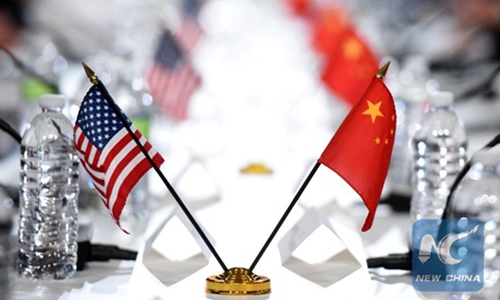HOME >> OPINION
US capping of Chinese journalists defies respect for differences
Source:Global Times Published: 2020/3/3 21:26:53

Photo: Xinhua
Editor's Note:
US Secretary of State Mike Pompeo on Monday announced the US will impose a personnel cap on the number of Chinese citizens permitted to work in the US for five Chinese state-run media outlets, cutting the number of employees to 100 from 160. The US had earlier this year listed the five outlets as "foreign missions," imposing restrictions on their ability to report some stories. How will these moves affect China-US relations? How should China react? Global Times reporters discussed these questions with two Chinese experts.
Da Wei, director of the Center for Strategic and International Security Studies of University of International Relations
The US' move this time can be seen as a continuation of a series of events triggered by the Wall Street Journal's (WSJ) commentary with the controversial headline "China Is the Real Sick Man of Asia." This time the US will cause even greater harm to China-US relations because it is cutting a large number of Chinese citizens who will be permitted to work for these five media outlets, while China revoked the press cards of only three journalists of the WSJ.
On February 18, the US State Department listed five Chinese media outlets as so-called foreign missions. Such a definition itself is problematic. Almost all traditional Chinese media outlets are state-owned, not private, then are all Chinese media outlets "foreign missions?" China and the US have different systems in terms of media, and thus it is wrong for the US to designate these media as foreign missions.
On this basis, the US has made a further step along the wrong path by imposing caps on the number of Chinese citizens employed by the five Chinese media outlets. No matter how the US chooses to designate them, these journalists help the two countries better understand each other. There have been challenges in China-US relations, and the two countries should try to increase mutual understanding rather than closing their doors to one another and creating further misjudgments.
There have been many disputes between China and the US in terms of the media. The US government and many US think tanks have issued reports and discussions about Chinese media outlets exerting their influence in the US. The US' move this time can be seen as a step that further leads to China-US decoupling. Such incidents will accumulate and eventually lead to a complete decoupling. The US is accelerating this trend.
Under these circumstances, I believe that China should remain rational and show a responsible attitude toward the development of China-US relations. Indeed, there must be diplomatic opposition and negotiations, but I do not recommend that we adopt tit-for-tat retaliatory measures, which might create a vicious circle. Currently, China should show a rational attitude which is different from that of the US.
Xin Qiang, deputy director of the Center for American Studies at Fudan University
The US government's move in cutting the workforce of five Chinese-state owned media outlets by 40 percent can be regarded as a follow-up to the US designating the outlets as "foreign missions," in an attempt to restrict normal exchanges between the two countries, including media coverage. Washington's strategy in cracking down on China involves diverse fields, including politics, economy, society, education and culture. Limiting the normal operation of the Chinese media outlets in the US is a part of that strategy.
It can also be seen as US retaliation against China for revoking of the press credentials of three Wall Street Journal (WSJ) reporters based in Beijing. China's move stems from the WSJ's headline "China is the Real Sick Man of Asia" which sparked fury among Chinese people for its strong racist sentiment.
How US media outlets operate in China and how Chinese media firms work in the US has remained unchanged for decades. The US' current attacks and restrictions on Chinese state-media are a pretext to further crack down on China.
If the Chinese government imposes similar measures in response, judging from the way US President Donald Trump administration behaves, the US may escalate its retaliation, and a vicious circle will be established between the world's two largest economies. The confrontation and the pattern of tit-for-tat retaliation between the two countries could undermine the already deteriorating bilateral ties.
Even if Beijing does not retaliate, the US is expected to take further actions in a bid to restrict Chinese media's engagement in the US. Before China had revoked the press credentials of three WSJ journalists, the US had already declared the US operation of five Chinese official media outlets as "foreign missions," which exposes Washington's intention to constrain the Chinese media.
It has become a trend for the US to impede its normal exchanges with China, which can be witnessed by US' efforts in limiting the activities of the Confucius Institute, viewing some Chinese students and visiting scholars in the US as potential security threats, and sharply reducing or suspending cooperation in scientific research. The decline of normal social and academic exchange between the two countries will certainly have a profound negative impact on the sound development of China-US ties.
Posted in: VIEWPOINT